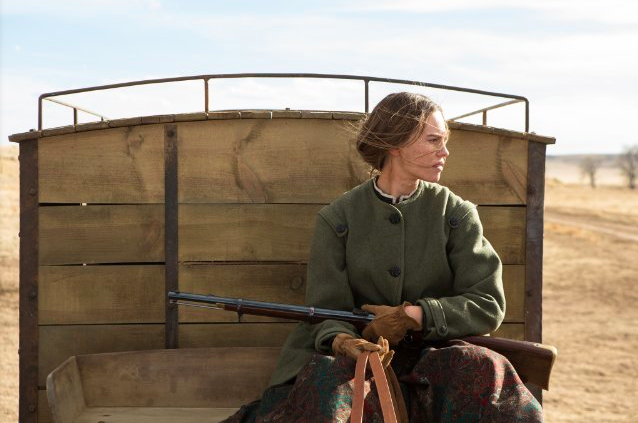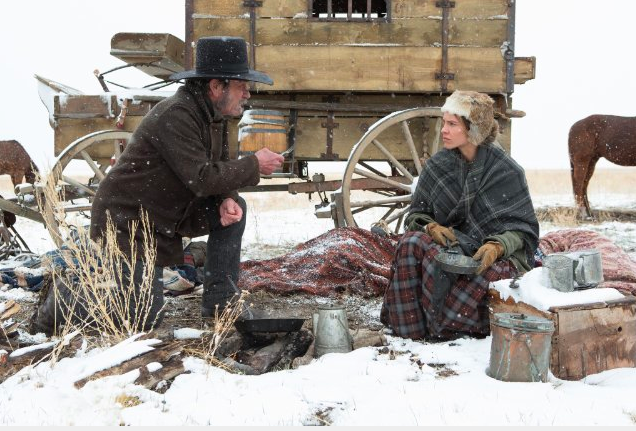CHICAGO – Patrick McDonald of HollywoodChicago.com appears on “The Morning Mess” with Dan Baker on WBGR-FM (Monroe, Wisconsin) on March 21st, 2024, reviewing the new streaming series “Manhunt” – based on the bestseller by James L. Swanson – currently streaming on Apple TV+.
Feminism Humbles Tommy Lee Jones in Heartfelt Western ‘The Homesman’
 Rating: 3.5/5.0 |
CHICAGO – In Tommy Lee Jones’ passion project “The Homesman,” the wild west provides a vivid setting for a battle in man’s endless war against women, as the film firmly occupying a genre strictly known for cowboys and pioneer machismo. It’s a sorrowful western from actor/writer/director Jones that often shines in its twilight, hoping to slightly reconcile the maltreatment unleashed on half of the world’s most powerful species.
Living outside standard domestic criteria of a developing America in the mid 1800s is Mary Bee Cuddy (Hilary Swank), a woman without a spouse or a child, who only takes care of herself and her giant farm. When three extremely psychologically-disturbed women are in need of transport to a hospital up north where they can receive help, Mary Bee volunteers to take on the journey, despite the town initially requiring that a man lead the expedition.
Meanwhile, a dusty vagrant named George Briggs (Tommy Lee Jones) sits on a horse, a noose connected to a tree tied around his neck. Mary Bee sees George in this state by chance, and frees George on the condition that he help her with taking the women across a wintry Nebraska. Rescuing women from emotionally negligent or abusive husbands, along with the overwhelming demands of their gender roles, George and Mary Bee traverse the open territory in a wagon, and face the elements of nature and fellow man along the way.
Boasting a huge cast that is doled out at a speed that matches its plot’s gradual nature, “The Homesman” is accelerated with its performances, especially galvanized turns from Jones and Swank. While its wagoning journey of “The Homesman” is propelled more distinctly by themes than narrative, the openness of the terrain and forces provide some thoroughly tense moments, such as when a character travels through a fog’s void, or when George and Mary Bee encounter natives with unpredictable intent.

‘The Homesman’
Photo credit: Roadside Attractions
Regarding Jones’ presence, the phrase “I don’t care” is the historic response that Jones muttered at Harrison Ford in “The Fugitive,” after Ford’s character proclaimed that he didn’t kill his wife. It’s the same stubborn self-interest that plays a leading part in “The Homesman,” a collection of themes that intrinsically jazz Jones, everyone else be damned. Jones will forgo logic to make his thematic checkpoints more profound, and he will hit his gender dynamics with a big ball of fire, right on the nose, whenever he so pleases. Brutality will be taken as is, with the film presenting psychological horrors to make it one of 2014’s bleaker films, amongst narrative left-turns that change the film’s direction entirely. And for you Meryl Streep fans, you might see her name in the opening credits, but you won’t see her show up for a long, long, long time. Squirm in your chair at a wagon’s pacing in a two-hour movie, Jones genuinely doesn’t care; the key word, it should be said, is genuine.
“The Homesman” is motivated by Jones’ desire to honor the heroism in the western genre that he loves, and to engage it with a progressive perspective on gender. Jones hits the topic with great zeal, where even John Ford-like red-blooded American sunsets are thrown in so much they become potentially tiresome. The film’s atmosphere becomes a significant attribute as well, matching the emptiness of the undeveloped America with its own cold, spacious tone.
At times, the ideological ambitions of “The Homesman” can be thwarted by its overzealousness. As exemplified in a scene in which it’s Mary Bee who tries to desperately court a man, “The Homesman” expresses that its not working within the separate complications of two opposed genders, but seeking revelation by switching them. Considering the complications within gender, this type of straight-faced role-reversal doesn’t provide as big of a step forward that Jones may think.

‘The Homesman’
Photo credit: Roadside Attractions
Nonetheless, in “The Homesman” Jones tackles gender politics with a vengeance, ready to shoot down the notions of men and women that have perpetuated in history, and most embarrassingly, the modern world. With Clint Eastwood’s “Million Dollar Baby” Swank at his side, the movie becomes an aggressive force against the ruthless sexism by man, its bleakness coming from the damage by men in a world where they feel to be superior. Embodying a bum of a man whose payback work becomes a journey of humbling enlightenment, the usually stoic Jones throws himself head-first into a polarizing project (Tommy Lee Jones v. everyone else) of nonetheless purified dedication.


